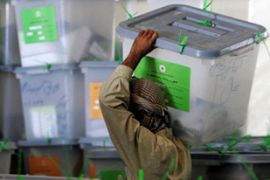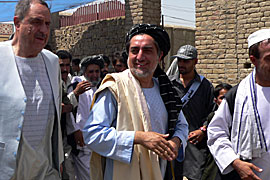Karzai pulls ahead in Afghan polls
Partial results show incumbent president has growing lead in landmark election race.

Under Afghan election law, a candidate would have to win over 50 per cent of the vote to avoid a runoff.
James Bays, Al Jazeera’s correspondent in Kabul, said: “I have to stress that these remain preliminary results.”
“But each time we get one of these announcements, we get a clearer picture of where we are going.”
Partial results
Waheed Omar, a spokesman for the Karzai campaign, told Al Jazeera the results were as the Karzai camp had expected.
“It’s quite predictable for the president because we had all these pollings – our own observations – and we thought it would be easy to get more than 50 per cent,” he said.
| In depth | |||||||
|
Aminullah Habibi, a research fellow at the UK Defence Academy, said Karzai’s strength came from his creation of a “kind of coalition that represents the majority of the ethnic groups”.
“I think he [Karzai] is unstoppable … with all the criticisms and irregularities that we’ve seen, despite all these, it is not unexpected that President Karzai might win,” he told Al Jazeera.
“He will get the majority of the Pashtun votes, as well as the other ethnic groups because the leaders of [the] other ethnic groups – including the Hazaras, the Uzbeks and half of, perhaps, the Tajiks – will go with him.”
The partial results also showed that Ramazan Bashardost, a Hazara who has campaigned on an anti-corruption platform, had won 14 per cent of the vote, putting him in third place with 277,404 votes.
Officials have still not given any figure for overall election turnout.
Alleged fraud
The results will not be finalised until September, after the election watchdog has examined the allegations of fraud that have overshadowed what is only Afghanistan’s second direct presidential election.
The complaints watchdog has said it is investigating more than 2,000 accusations of fraud and abuse, including 270 thought serious enough to alter the outcome.
A large number of fraud allegations have been concentrated in Afghanistan’s southern provinces, which largely support Karzai.
The southern provinces have been late to report results, but they are also the areas where Taliban violence and threats were most successful in scaring away voters.
Afghanistan’s election is also a test for the strategy of Barack Obama, the US president, who has rushed thousands of extra troops to Afghanistan in a bid to reverse Taliban gains.
Western concerns
In the build-up to the elections, Washington was concerned by the return to Afghanistan from exile of Abdul Rashid Dostum, an Uzbek commander viewed by Western officials as a warlord, in support of Karzai.
A spokesman for Dostum said on Saturday that he had again left the country, returning to Turkey.
 |
| Abdullah, centre, stands in second place, behind Karzai, in the election race [AFP] |
Meanwhile, Gordon Brown, the British prime minister, arrived in Afghanistan to visit British troops at Camp Bastion, Britain’s main military base in the country.
Brown, who has come under pressure at home over the UK’s mission in Afghanistan, used his visit to counter criticism that his country’s war effort is being undermined by a lack of equipment and personnel.
He said that he had spoken to both Karzai and Abdullah, calling for accelerated efforts to train Afghan soldiers and police to take on more of the burden of battling the Taliban.
“I’ve talked to Mr Karzai and Mr Abdullah and I’ve made it absolutely clear to them that we expect over the next year that they will train – and we will work with them to do so – around 50,000 more Afghan forces,” Brown said.
A total of 207 British military personnel have died in operations in Afghanistan since the US-led invasion toppled the Taliban in 2001.
